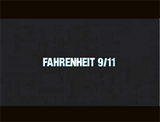
|
Fahrenheit 9/11 (2004)
In Michael Moore's scathing documentary to indict
President George W. Bush's failure to take immediate action, his
implicit blame for not readying America for terrorist threats and
his inept handling of the terrorist crisis, and his agenda to go
to war in Afghanistan and Iraq:
- memorable images included Bush's continued reading
of the children's book My Pet Goat in a Florida elementary
school after the first plane crashed into the World Trade Center
(filmmaker Michael Moore narrated: "When informed of the first
plane hitting the World Trade Center, where terrorists had struck
just eight years prior, Mr. Bush decided to go ahead with his photo
opportunity...") - and Moore's commentary about how President
Bush might have been thinking about his business ties to the Bin
Laden family: ("...a business relationship with the family
of George W. Bush. Is that what he was thinking about? Because
if the public knew this, it wouldn't look very good. Was he thinking,
'You know, I need a big black marker.'?")
- the many self-incriminating Bush clips (such as when
he demonstrated his golf swing - "Now watch this drive!" -
immediately after calling on nations to stop terrorist killers,
his stumbling through speeches and delivering such damning lines
as: "What an impressive crowd: the haves, and the have-mores.
Some people call you the elite, I call you my base")
- the mall scenes in which Marine recruiters targeted
minority teenagers for enrollment
- the documentarian's concluding questioning of Democratic
and Republican politicians about enrolling their sons for military
duty, and the misleading statements by President Bush and his associates
about the need for war (that prompted many lower class Americans
to serve and sacrifice themselves in an unnecessary war), and Michael's
Moore's final voice-over narration: ("Of course, not a single
member of Congress wanted to sacrifice their child for the war in
Iraq. And who could blame them? Who would want to give up their child?
Would you? Would he? I've always been amazed that the very people
forced to live in the worst parts of town, go to the worst schools,
and who have it the hardest, are always the first to step up, to
defend that very system. They serve so that we don't have to. They
offer to give up their lives so that we can be free. It is remarkably
their gift to us. And all they ask for in return is that we never
send them into harm's way unless it's absolutely necessary. Will
they ever trust us again?... George Orwell once wrote that it's not
a matter of whether the war is not real, or if it is. Victory is
not possible. The war is not meant to be won - it is meant to be
continuous. A hierarchical society is only possible on the basis
of poverty and ignorance. This new version is the past and no different
past can ever have existed. In principle, the war effort is always
planned to keep society on the brink of starvation. The war is waged
by the ruling group against its own subjects and its object is not
the victory over either Eurasia or East Asia but to keep the very
structure of society intact")
- the final quote: an ironic statement from President
Bush during a speech: ("There's an old saying in Tennessee,
I know it's in Texas, it's probably in Tennessee, that says, 'Fool
me once, shame on, shame on you. If fooled, you can't get fooled
again'") - Moore summarized: ("For once, we agreed")
|
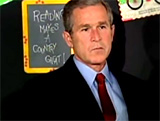
Bush on 9/11 in Florida Elementary School
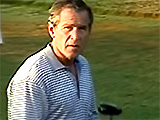
"Now Watch This Drive"
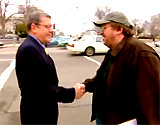
On-the-Street Interviews
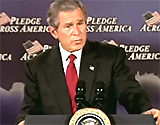
Bush: 'Fool me once, shame on, shame on you. If fooled,
you can't get fooled again'
|





